Standard Bank Group Bundle
Who Really Owns Standard Bank Group?
Understanding a company's ownership structure is crucial for grasping its strategic direction and potential for growth. The evolution of Standard Bank Group's ownership, from its roots as Standard Bank of British South Africa to its current status, tells a compelling story. This exploration will uncover the key players and pivotal moments that have shaped the bank's destiny.
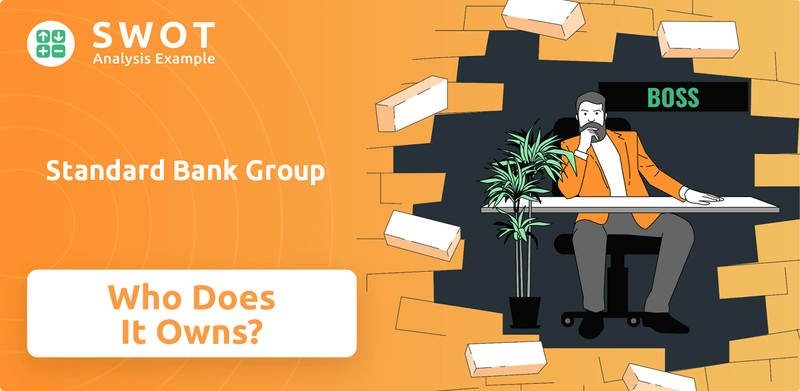
Standard Bank Group, a financial powerhouse headquartered in Johannesburg, South Africa, has a rich history dating back to 1862. The Standard Bank Group SWOT Analysis provides a deeper dive into its strengths and weaknesses. The bank's journey, marked by significant shifts in ownership, including the departure of Standard Chartered Bank, has been instrumental in its expansion across Africa. Today, understanding the Standard Bank ownership structure is key to appreciating its market position and future prospects, including who the major Standard Bank shareholders are.
Who Founded Standard Bank Group?
The genesis of the Standard Bank Group, a prominent financial institution, can be traced back to 1862. It was established in London by a group of businessmen. The initiative was spearheaded by John Paterson, a notable figure in South African politics.
The bank's operational journey began in 1863 in Port Elizabeth, South Africa. Initially, the bank expanded through mergers with other financial entities, including the Commercial Bank of Port Elizabeth and the British Kaffrarian Bank. The bank played a crucial role in financing the development of the diamond fields in Kimberley in 1867.
Over time, the bank evolved, dropping 'British' from its name in 1883, becoming Standard Bank of South Africa Limited. This marked a significant shift in its identity and focus. The evolution reflects the bank's adaptation to the changing economic and political landscape of South Africa.
Standard Bank Group was founded in 1862 in London. The bank began operations in 1863 in Port Elizabeth, South Africa.
The bank expanded by merging with other banks. It played a key role in financing the diamond fields in Kimberley.
The name changed in 1883 to Standard Bank of South Africa Limited. This reflected its growing presence in South Africa.
In 1962, South African operations became a subsidiary. Shares were offered to the South African public in 1967.
The British parent company initially held over 80% of the shares. Ownership shifted towards South African investors over time.
For detailed information on the Standard Bank shareholders and Standard Bank ownership structure, consult the latest annual reports and investor relations materials.
The early Standard Bank ownership structure was primarily controlled by the British parent company. As the bank evolved, the ownership transitioned, with shares gradually being offered to South African investors. The exact equity splits among the founders aren't available in the provided information. For insights into the current Standard Bank Group's financial strategies, consider reading about the Growth Strategy of Standard Bank Group.
Key points in the ownership history of Standard Bank.
- 1862: Foundation in London.
- 1863: Commencement of operations in South Africa.
- 1867: Involvement in financing the Kimberley diamond fields.
- 1883: Name change to Standard Bank of South Africa Limited.
- 1962: South African operations become a subsidiary.
- 1967: Shares offered to the South African public.
Standard Bank Group SWOT Analysis
- Complete SWOT Breakdown
- Fully Customizable
- Editable in Excel & Word
- Professional Formatting
- Investor-Ready Format
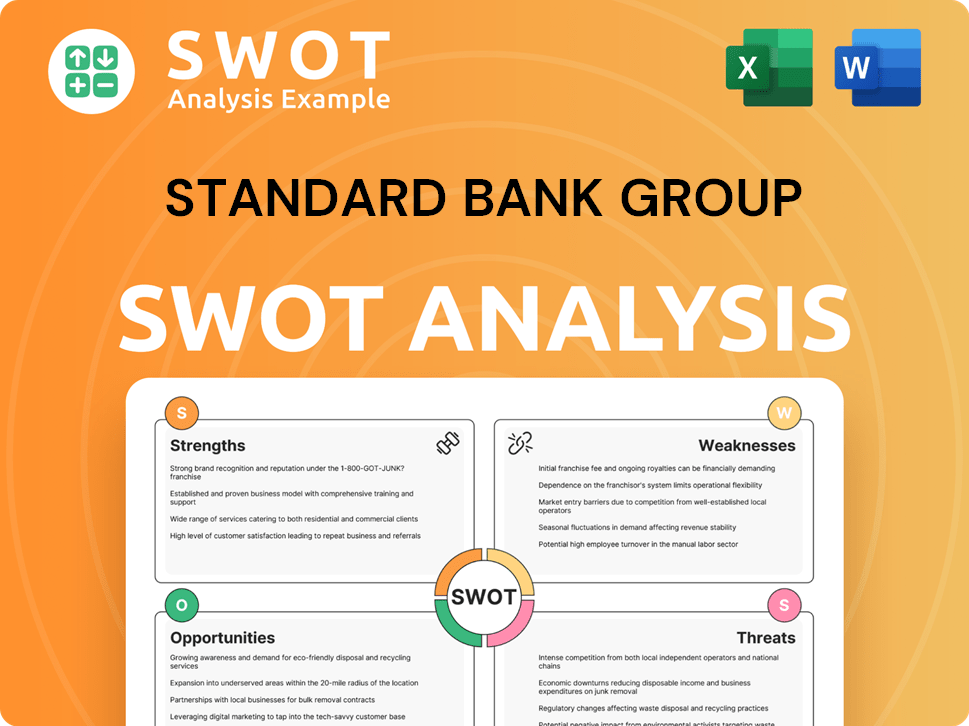
How Has Standard Bank Group’s Ownership Changed Over Time?
The ownership structure of Standard Bank Group has seen significant changes since its inception. Initially, Standard Chartered Bank, the merged entity of the original parent bank and Chartered Bank of India, Australia, and China, held a controlling stake. A crucial shift occurred in 1969 when Standard Bank Investment Corporation (now Standard Bank Group) became the holding company. Standard Chartered Bank gradually reduced its shareholding, culminating in the sale of its remaining 39% stake in 1987, transferring complete ownership to South African investors.
The transition continued with Liberty Life (and its affiliates) becoming the major shareholder until 1999. The most recent developments include the strategic investment by Industrial and Commercial Bank of China (ICBC) in 2008, which solidified a significant partnership and influenced the company's expansion across Africa and global financial centers. These changes reflect the evolution of Standard Bank's ownership and its strategic partnerships.
| Stakeholder | Percentage of Shares (as of Dec 31, 2024) | Approximate Number of Shares |
|---|---|---|
| Industrial and Commercial Bank of China (ICBC) | 19.6% | 325 million |
| Government Employees Pension Fund (PIC) | 14.5% | 241.3 million |
| The Vanguard Group, Inc. (as of June 4, 2025) | 3.03% | 50.20 million |
As of December 31, 2024, Standard Bank Group's ownership is diversified. Foreign shareholders hold approximately 50.6% of the shares, with South African shareholders holding 49.4%. China has the largest foreign shareholding at 19.6%, followed by the United States at 12.9%. The total number of ordinary shares in issue was 1,646,211,851 as of May 30, 2025. Understanding the ownership structure is crucial for investors and stakeholders interested in the Marketing Strategy of Standard Bank Group.
The ownership of Standard Bank Group has evolved significantly, reflecting strategic partnerships and shifts in shareholder composition.
- ICBC is a major shareholder, holding a significant stake and influencing the bank's strategic direction.
- The shareholding is split between South African and foreign investors, with a substantial portion held by institutional investors.
- Understanding the ownership structure is essential for anyone interested in the bank's performance and future strategies.
Standard Bank Group PESTLE Analysis
- Covers All 6 PESTLE Categories
- No Research Needed – Save Hours of Work
- Built by Experts, Trusted by Consultants
- Instant Download, Ready to Use
- 100% Editable, Fully Customizable
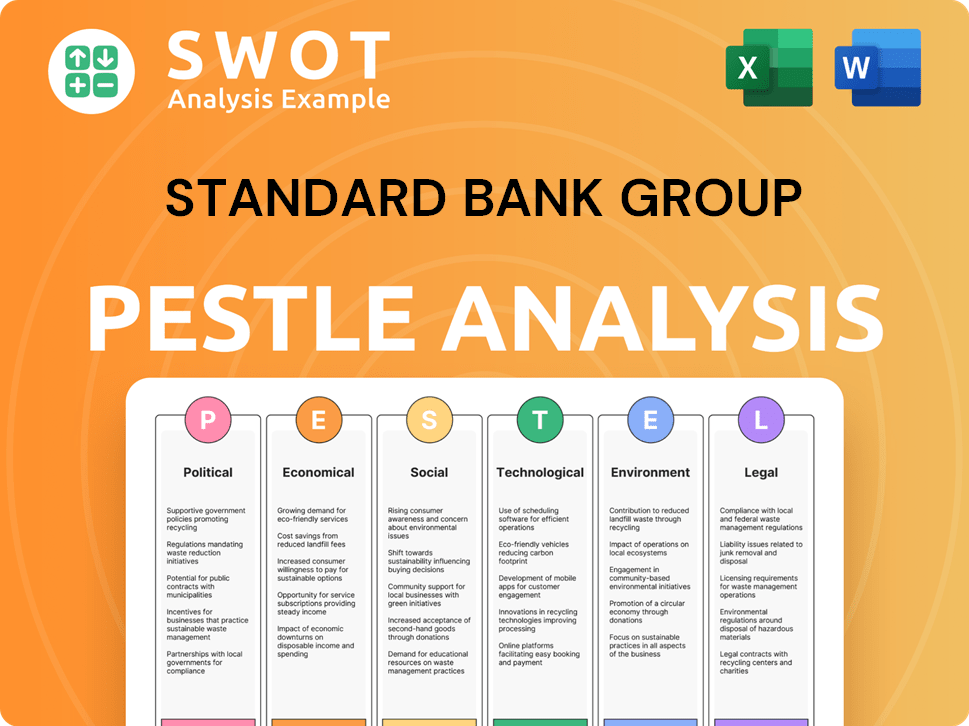
Who Sits on Standard Bank Group’s Board?
The governance of Standard Bank Group is overseen by its Board of Directors, which includes a mix of executive, non-executive, and independent non-executive directors. This board is dedicated to maintaining high standards of corporate governance, transparency, and accountability. The board's composition and the voting structure are key elements in understanding the dynamics of Standard Bank ownership and its operational framework.
Key individuals on the board and their representation, as of March 12, 2025, include Nonkululeko Nyembezi-Heita as Chairperson, and Sim Tshabalala as Chief Executive. Rose Ogega and Lwazi Bam were appointed to various committees on March 12, 2025. Sola David-Borha, appointed as a non-executive director on March 13, 2024, and reclassified as an independent non-executive director on May 23, 2024, also serves on key committees. Other directors include Paul Cook, Martin Oduor-Otieno, Li Li, Geraldine Fraser-Moleketi, and Trix Kennealy, all re-elected at recent AGMs.
| Director | Role | Appointment Date |
|---|---|---|
| Nonkululeko Nyembezi-Heita | Chairperson | N/A |
| Sim Tshabalala | Chief Executive | N/A |
| Rose Ogega | Group Audit Committee (GAC) and Group Risk and Capital Management Committee (GRCMC) Member | March 12, 2025 |
| Lwazi Bam | Group Remuneration Committee (Remco) Member | March 12, 2025 |
| Sola David-Borha | Independent Non-Executive Director | May 23, 2024 |
| Paul Cook | Director | N/A |
| Martin Oduor-Otieno | Director | N/A |
| Li Li | Director | N/A |
| Geraldine Fraser-Moleketi | Director | N/A |
| Trix Kennealy | Director | N/A |
The voting structure at Standard Bank Group generally follows a one-share-one-vote principle for ordinary shares. Shareholders vote on resolutions at the Annual General Meeting (AGM), including the election of directors and approval of the annual report. At the AGM held on June 9, 2025, all ordinary and special resolutions were passed by the requisite majority. As of May 30, 2025, 83% of the issued ordinary shares were voteable. Furthermore, the Industrial and Commercial Bank of China (ICBC), a major shareholder, has a nominated non-executive director and deputy chairman, reflecting their influence on the board. To understand the competitive environment, you can explore the Competitors Landscape of Standard Bank Group.
The Board of Directors at Standard Bank Group includes a mix of executive, non-executive, and independent non-executive directors, ensuring robust governance.
- Shareholders vote on key resolutions, with a one-share-one-vote principle.
- ICBC, a major shareholder, has board representation.
- Recent AGMs saw the re-election of several directors.
- 83% of ordinary shares were voteable as of May 30, 2025.
Standard Bank Group Business Model Canvas
- Complete 9-Block Business Model Canvas
- Effortlessly Communicate Your Business Strategy
- Investor-Ready BMC Format
- 100% Editable and Customizable
- Clear and Structured Layout
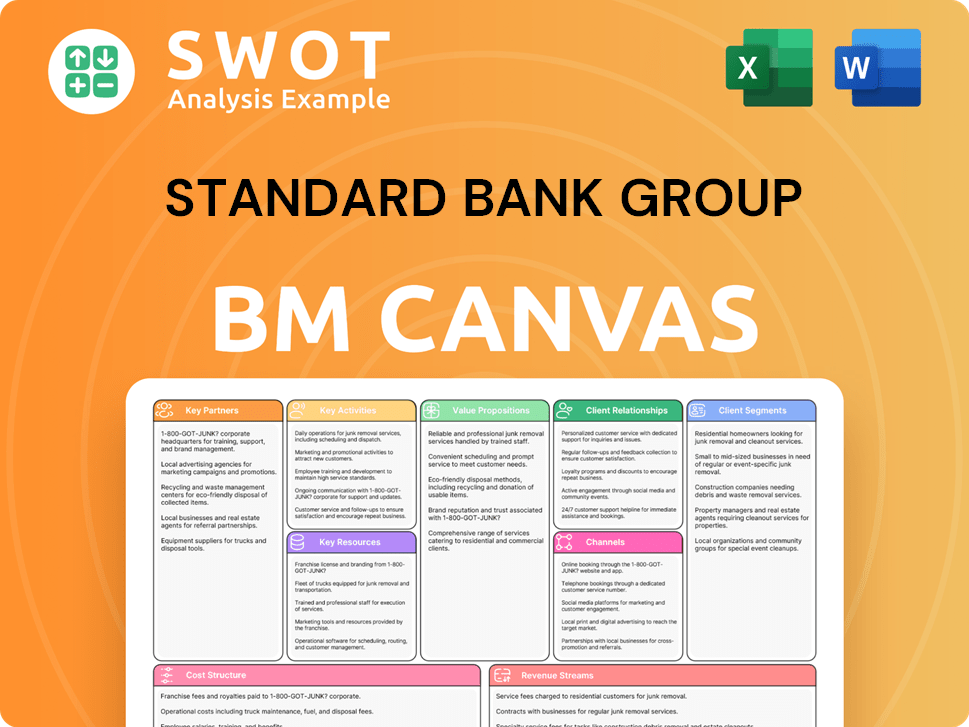
What Recent Changes Have Shaped Standard Bank Group’s Ownership Landscape?
Over the past few years, Standard Bank Group has undertaken strategic initiatives impacting its ownership structure. A significant move was the proposed acquisition of Liberty Holdings Limited in 2021, aiming for full ownership and closer integration. This was contingent on shareholder and regulatory approvals. In 2023, Liberty Two Degrees (L2D) became a wholly-owned subsidiary within the Standard Bank Group, with its listing on the JSE terminated in November 2023. These actions reflect the group's efforts to streamline operations and enhance its market position.
Leadership changes have also been a feature. As of April 8, 2025, Sim Tshabalala, the Group CEO, also took on the role of Interim Chief Executive of The Standard Bank of South Africa Limited (SBSA). This dual role is temporary, pending further announcements on executive succession planning. Lungisa Fuzile was appointed as Interim Chief Executive of Africa Regions and Offshore, also effective April 8, 2025. These changes indicate ongoing adjustments within the company's leadership.
| Metric | Details | Date |
|---|---|---|
| Institutional Owners | 204 | April 25, 2025 |
| Total Shares Held by Institutions | 116,375,671 | April 25, 2025 |
| Major Institutional Investors | Vanguard Total International Stock Index Fund, Vanguard Emerging Markets Stock Index Fund, iShares Core MSCI Emerging Markets ETF | April 25, 2025 |
Institutional ownership continues to be a key aspect of Standard Bank ownership. As of April 25, 2025, the group has 204 institutional owners and shareholders. Major institutional investors include Vanguard and iShares. Shareholder engagement is evident through voting on resolutions at annual general meetings, such as director re-elections and remuneration policies. Furthermore, the bank's focus on growth in Africa, including potential acquisitions in East Africa, as mentioned in January 2024, suggests a strategic approach to expanding its footprint. The bank anticipates a more active M&A landscape in 2025.
The group has undertaken strategic initiatives that affect its ownership structure, including the proposed acquisition of Liberty Holdings Limited. The company continually adjusts its leadership to meet market demands.
Institutional investors are a significant part of Standard Bank's ownership. Shareholders actively participate in the company's governance through voting on resolutions. The company has 204 institutional owners and shareholders as of April 25, 2025.
The company is focused on growth in Africa, including potential acquisitions in East Africa, and anticipates a more active M&A landscape in 2025. The bank continues to adjust its strategies to drive growth and adapt to market dynamics.
The major shareholders include Vanguard Total International Stock Index Fund, Vanguard Emerging Markets Stock Index Fund, and iShares Core MSCI Emerging Markets ETF. The group has a strong institutional investor base.
Standard Bank Group Porter's Five Forces Analysis
- Covers All 5 Competitive Forces in Detail
- Structured for Consultants, Students, and Founders
- 100% Editable in Microsoft Word & Excel
- Instant Digital Download – Use Immediately
- Compatible with Mac & PC – Fully Unlocked
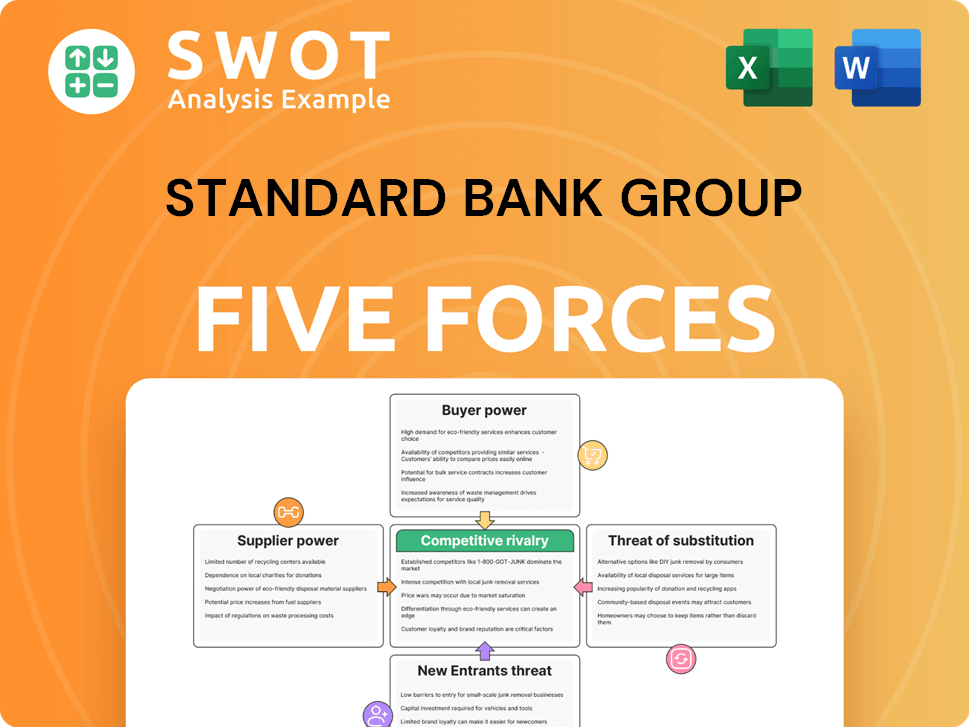
Related Blogs
- What are Mission Vision & Core Values of Standard Bank Group Company?
- What is Competitive Landscape of Standard Bank Group Company?
- What is Growth Strategy and Future Prospects of Standard Bank Group Company?
- How Does Standard Bank Group Company Work?
- What is Sales and Marketing Strategy of Standard Bank Group Company?
- What is Brief History of Standard Bank Group Company?
- What is Customer Demographics and Target Market of Standard Bank Group Company?
Disclaimer
All information, articles, and product details provided on this website are for general informational and educational purposes only. We do not claim any ownership over, nor do we intend to infringe upon, any trademarks, copyrights, logos, brand names, or other intellectual property mentioned or depicted on this site. Such intellectual property remains the property of its respective owners, and any references here are made solely for identification or informational purposes, without implying any affiliation, endorsement, or partnership.
We make no representations or warranties, express or implied, regarding the accuracy, completeness, or suitability of any content or products presented. Nothing on this website should be construed as legal, tax, investment, financial, medical, or other professional advice. In addition, no part of this site—including articles or product references—constitutes a solicitation, recommendation, endorsement, advertisement, or offer to buy or sell any securities, franchises, or other financial instruments, particularly in jurisdictions where such activity would be unlawful.
All content is of a general nature and may not address the specific circumstances of any individual or entity. It is not a substitute for professional advice or services. Any actions you take based on the information provided here are strictly at your own risk. You accept full responsibility for any decisions or outcomes arising from your use of this website and agree to release us from any liability in connection with your use of, or reliance upon, the content or products found herein.